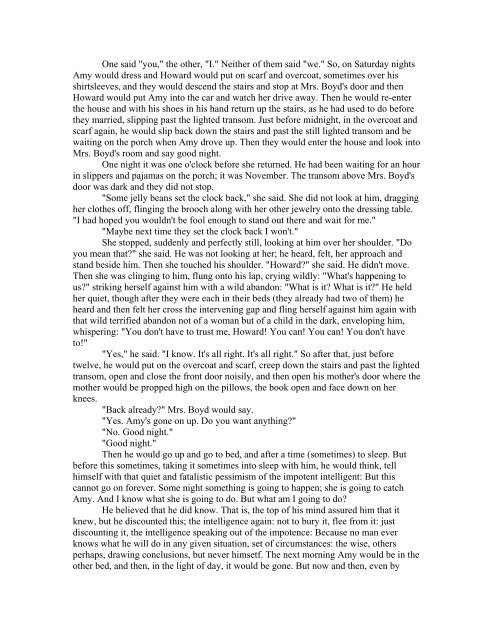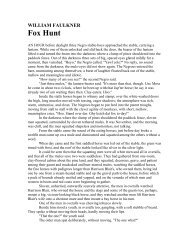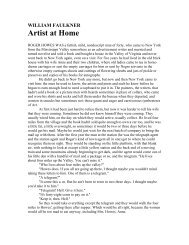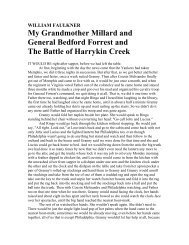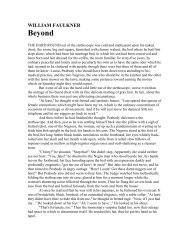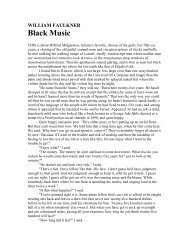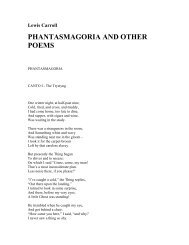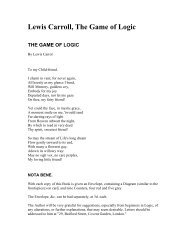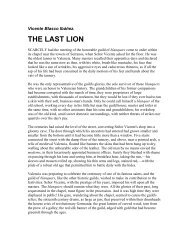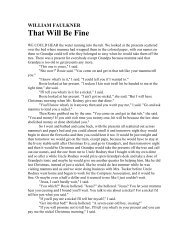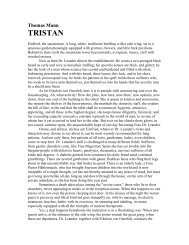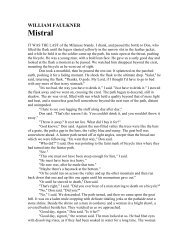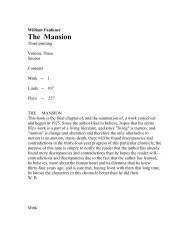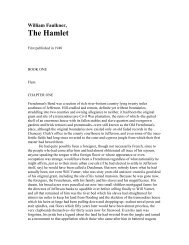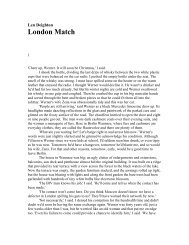WILLIAM FAULKNER, The Brooch - literature save 2
WILLIAM FAULKNER, The Brooch - literature save 2
WILLIAM FAULKNER, The Brooch - literature save 2
You also want an ePaper? Increase the reach of your titles
YUMPU automatically turns print PDFs into web optimized ePapers that Google loves.
One said "you," the other, "I." Neither of them said "we." So, on Saturday nightsAmy would dress and Howard would put on scarf and overcoat, sometimes over hisshirtsleeves, and they would descend the stairs and stop at Mrs. Boyd's door and thenHoward would put Amy into the car and watch her drive away. <strong>The</strong>n he would re-enterthe house and with his shoes in his hand return up the stairs, as he had used to do beforethey married, slipping past the lighted transom. Just before midnight, in the overcoat andscarf again, he would slip back down the stairs and past the still lighted transom and bewaiting on the porch when Amy drove up. <strong>The</strong>n they would enter the house and look intoMrs. Boyd's room and say good night.One night it was one o'clock before she returned. He had been waiting for an hourin slippers and pajamas on the porch; it was November. <strong>The</strong> transom above Mrs. Boyd'sdoor was dark and they did not stop."Some jelly beans set the clock back," she said. She did not look at him, draggingher clothes off, flinging the brooch along with her other jewelry onto the dressing table."I had hoped you wouldn't be fool enough to stand out there and wait for me.""Maybe next time they set the clock back I won't."She stopped, suddenly and perfectly still, looking at him over her shoulder. "Doyou mean that?" she said. He was not looking at her; he heard, felt, her approach andstand beside him. <strong>The</strong>n she touched his shoulder. "Howard?" she said. He didn't move.<strong>The</strong>n she was clinging to him, flung onto his lap, crying wildly: "What's happening tous?" striking herself against him with a wild abandon: "What is it? What is it?" He heldher quiet, though after they were each in their beds (they already had two of them) heheard and then felt her cross the intervening gap and fling herself against him again withthat wild terrified abandon not of a woman but of a child in the dark, enveloping him,whispering: "You don't have to trust me, Howard! You can! You can! You don't haveto!""Yes," he said. "I know. It's all right. It's all right." So after that, just beforetwelve, he would put on the overcoat and scarf, creep down the stairs and past the lightedtransom, open and close the front door noisily, and then open his mother's door where themother would be propped high on the pillows, the book open and face down on herknees."Back already?" Mrs. Boyd would say."Yes. Amy's gone on up. Do you want anything?""No. Good night.""Good night."<strong>The</strong>n he would go up and go to bed, and after a time (sometimes) to sleep. Butbefore this sometimes, taking it sometimes into sleep with him, he would think, tellhimself with that quiet and fatalistic pessimism of the impotent intelligent: But thiscannot go on forever. Some night something is going to happen; she is going to catchAmy. And I know what she is going to do. But what am I going to do?He believed that he did know. That is, the top of his mind assured him that itknew, but he discounted this; the intelligence again: not to bury it, flee from it: justdiscounting it, the intelligence speaking out of the impotence: Because no man everknows what he will do in any given situation, set of circumstances: the wise, othersperhaps, drawing conclusions, but never himsetf. <strong>The</strong> next morning Amy would be in theother bed, and then, in the light of day, it would be gone. But now and then, even by


